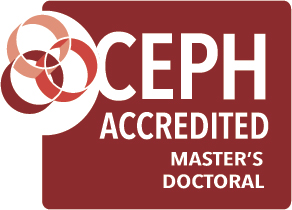Salary & Career Outlook
The salary and job outlook for MPH graduates depend on your chosen concentration or specialty. Each field offers unique opportunities and earning potential, reflecting the skills and expertise required for that area. Explore your specialty to learn more about the career paths and benefits it provides.
- ZipRecruiter currently lists jobs ranging from $64,000 up to $165,000 annually.
- The U.S. Bureau of Labor Statistics reports that the national average varies from $78,240 to $196,970.
- Job outlook for the next 10 years: 28% (much faster than average).
Faculty & Staff
Learn more about our faculty and staff by visiting the CPH Faculty and Staff page.
Curriculum
The curriculum for our MPH program varies based on your chosen concentration. Click on the links below to view detailed curriculum information for each specialty concentration:
Explore each curriculum to find the one that best fits your career aspirations.
About the Program
Cohort full-time: Students take 12 hours each semester in person.
- On-campus: UNTHSC is located in Fort Worth, TX.
- Two years: Students complete the program in five semesters, including the summer.
- Fall entrance: New students begin the program each fall semester. There are no spring or summer start options.
- Small class size. Core classes range from 20 to 35 enrolled, concentration classes from 10-20 students.
- Cohort format: Students complete the program in a pre-determined sequence and pace. This is shown to improve student success and completion rates, offer strong networking opportunities between students and develop quality relationships with program faculty.
Online: Students typically take two class per 16-week term. Students are expected to participate in four professional development sessions in each semester of enrollment to include interprofessional education, Be Well and other professional development sessions. Students are also required to complete six hours of community service each fall and spring.
CPH professional development and IPE sessions: Students participate in weekly interlude meetings, which consist of additional career and field prep programs. Programs range from alumni panels to networking, coaching and guest speakers specific to concentration studies. IPE activities bring students from across university schools together for cross-disciplinary training. Students gain experience in collaborative work with medical professionals in real life scenarios.
MPH Specialty Concentrations
Discover your path to improving public health and making a difference in your community. Explore our specialized Master of Public Health concentrations designed to match your interests and career goals:
- Epidemiology: Advance your career with a master’s in epidemiology.
- Public Health Leadership: Enhance your career opportunities with a master’s in public health leadership.
- Biostatistics: Pursue your path to a data science career with our biostatistics master’s programs.
- Maternal and Child Health: Focus on improving the health of mothers, children and families worldwide.
Practice Experience
MPH students complete an intensive hands-on experience with local public health nonprofits, governmental institutions or health systems.
Students complete their practice experience with organizations based on their field passions and career goals.
Students complete 400 hours over the course of three semesters.
Through this experience, students complete a significant project on behalf of the organization. This could entail designing and delivering a new education program, supporting and analyzing a deep data set or managing policy analysis and development.
Through this professional field experience, you will gain a professional reference, interview discussion materials and new confidence in your career path.
Program Overview and Admissions
At UNTHSC, the duration to complete a Master of Public Health degree varies based on the format and pace you choose. Here are the typical timelines:
- Full-time programs: Most full-time students complete the MPH program in about two years. This timeframe also includes coursework, a practicum and any required capstone projects.
- Part-time programs: For part-time students, the duration can extend to three to four years. Part-time schedules also allow for more flexibility, accommodating working professionals or those with other commitments.
- Accelerated programs: Some institutions, like UNTHSC, also offer accelerated MPH programs that can be completed in as little as one year. These intensive programs also require a heavier course load each semester.
- Online programs: Online MPH programs generally follow similar timelines to their on-campus counterparts. Full-time online programs usually take about two years, while part-time online programs can take up to three to four years. Some online programs offer accelerated options as well.
Factors influencing the duration of getting an MPH degree
- Course load: Full-time vs. part-time status significantly affects the completion time.
- Program requirements: Some programs may have more comprehensive practicum or capstone requirements.
- Specialization: Certain specializations might require additional coursework or fieldwork.
- Flexibility: Online and hybrid programs may also offer more flexibility, potentially speeding up or extending the completion time based on individual pace.
For more detailed information about the MPH program timelines at UNTHSC, you can visit or contact the HSC admissions office.
Additionally, with the growing demand for public health professionals, now is the perfect time to advance your career and apply in a Master of Public Health (MPH) degree program.
To be admitted into the Master of Public Health program at The University of North Texas Health Science Center at Fort Worth (UNTHSC), applicants must meet several criteria. Here are the key admission requirements:
- Academic qualifications:
- Bachelor’s degree: Applicants must hold a bachelor’s degree from an accredited institution.
- GPA: There is no minimum GPA requirement for any MPH program. While a 3.0 GPA is recommended, it is not mandatory.
- Standardized tests:
- GRE Scores: While some MPH programs may require GRE scores, UNTHSC’s MPH programs do not require GRE scores for admission. However, if you have taken the GRE, you may choose to submit your scores as part of your application.
- Prerequisite courses:
- Certain specializations within the MPH program may require specific prerequisite coursework. For example, the MPH biostatistics and data science specialization may require a background in college algebra and calculus.
- Professional experience:
- While not always mandatory, having relevant professional or volunteer experience in public health or a related field can strengthen your application.
- Application components:
- Personal statement: A statement of purpose outlining your career goals, reasons for pursuing an MPH and how the program aligns with your professional aspirations.
- Letters of recommendation: Typically, two to three letters of recommendation from academic or professional references who can speak to your qualifications and potential for success in the program.
- Resume/CV: A current resume or CV detailing your educational background, work experience and any relevant skills or achievements.
- English proficiency (for international applicants):
- TOEFL/IELTS Scores: Non-native English speakers must submit TOEFL or IELTS scores to demonstrate English proficiency. The minimum required scores are typically 85 for TOEFL (iBT) and 6.5 for IELTS.
Additional information and deadlines
- Application deadlines:
- MPH In-Person/Cohort: SOPHAS, Priority March 15 / Final July 1
- MPH Online: SOPHAS, December 1 / February 15, May 1, July 15 / September 15
- Detailed deadlines for other programs and specializations can be found on the UNTHSC College of Public Health website.
- Financial aid and scholarships:
- HSC offers various financial aid options, including scholarships, grants and loans. All applicants are considered for scholarships at the time of admission.
For more detailed information about the admission requirements and the application process, you can visit the HSC College of Public Health Admissions page or contact the admissions office at admissions@unthsc.edu.
Additionally, with the growing demand for public health professionals, now is the perfect time to advance your career and apply in a Master of Public Health (MPH) degree program.
The University of North Texas Health Science Center at Fort Worth (UNTHSC) offers a variety of specializations within its Master of Public Health program. These specializations allow students to tailor their education to their specific career goals and interests in the public health field. For example, here are the primary MPH specializations available at HSC:
- Maternal and child health:
- Description: This specialization focuses on improving the health outcomes of mothers and children through public health programs and initiatives. Students will also learn to develop and implement strategies that address the unique health needs of this population.
- Career opportunities: Maternal and child health specialist, public health educator, program coordinator.
- Epidemiology:
- Description: Students in this specialization are trained to investigate and analyze the patterns, causes and effects of health and disease conditions in populations. This track emphasizes data collection, analysis and interpretation in order to inform public health decisions and policies.
- Career opportunities: Epidemiologist, infectious disease specialist, research scientist.
Transform lives with a master’s degree in public health with a specialization
- Biostatistics and data science:
- Description: This specialization prepares students to apply statistical methods and data analysis techniques to public health research and practice. It will also focus on managing and interpreting complex data sets to support evidence-based decision-making in public health.
- Career opportunities: Biostatistician, data analyst, research scientist.
- Public health leadership:
- Description: This track is designed for students aspiring to leadership roles in public health. It provides interdisciplinary skills in order to tackle population health issues, community health challenges and health equity. The curriculum includes management, policy development and strategic planning.
- Career opportunities: Health services manager, public health director, health policy analyst.
Each specialization at UNTHSC is designed to equip students with the skills and knowledge needed in order to excel in their chosen field. The curriculum combines theoretical learning with practical experience. This will also ensure that graduates are well-prepared to address real-world public health challenges. This comprehensive approach to public health education ensures that HSC graduates are capable of making significant contributions to public health and advancing their careers in a variety of settings.
Additionally, with the growing demand for public health professionals, now is the perfect time to advance your career and apply in a Master of Public Health (MPH) degree program.
Yes. The University of North Texas Health Science Center at Fort Worth (UNTHSC) offers several scholarships for students enrolled in the Master of Public Health program. These scholarships are tailored in order to help alleviate the financial burden of tuition and other expenses, making it more accessible for students to pursue their public health education.
Types of MPH scholarships available
- Merit-based scholarships:
- Dean’s Award: Awarded to students with outstanding academic achievements. This scholarship can significantly reduce tuition costs and may qualify non-resident students for in-state tuition rates.
- President’s Award: Given to students who demonstrate exceptional academic performance and leadership qualities.
- Chancellor’s Award: Another merit-based scholarship aimed at recognizing academic excellence among MPH students.
- Need-based scholarships:
- UNTHSC offers financial aid for students who demonstrate financial need. These scholarships are designed to support students who may not have the financial resources to cover the full cost of their education.
- Program-specific scholarships:
- Some scholarships are specific to certain MPH specializations. For example, students specializing in maternal and child health or epidemiology may have access to additional funding opportunities tailored to their fields of study.
- External scholarships:
- In addition to institutional scholarships, MPH students are encouraged to apply for external scholarships.
- Organizations such as the American Public Health Association (APHA) and the Association of Schools and Programs of Public Health (ASPPH) offer scholarships and fellowships for public health students.
The application process
- Automatic consideration: All applicants to the MPH program are automatically considered for merit-based scholarships at the time of admission. There is no separate application required for these awards.
- Additional applications: For some need-based and program-specific scholarships, students may need to submit additional applications or provide further documentation to demonstrate eligibility.
Master’s degree in public health financial aid and support
- Graduate assistantships (GA), research assistantships (RA) and teaching assistantships (TA): These positions are available to MPH students and offer stipends as well as professional experience. While these positions do not typically include tuition waivers, they provide valuable financial and professional benefits.
- Loans and grants: HSC’s Financial Aid Office can assist students in applying for federal and state loans and grants in order to help cover the cost of their education.
- How to apply: For detailed information on available scholarships and the application process, students should visit the Financial Aid Office or contact the Financial Aid Office directly at finaid@unthsc.edu.
By taking advantage of these scholarships and financial aid opportunities, MPH students at UNTHSC can reduce their financial burden and therefore focus on their studies and future careers in public health. Additionally, with the growing demand for public health professionals, now is the perfect time to advance your career and apply in a Master of Public Health (MPH) degree program.
Yes, international students can receive financial aid for Master of Public Health programs at The University of North Texas Health Science Center at Fort Worth (UNTHSC). Here are some of the financial aid options available:
- Institutional scholarships:
- Merit-based scholarships: International students are eligible for merit-based scholarships such as the Dean’s Award, President’s Award and Chancellor’s Award. These scholarships are awarded based on academic excellence and leadership qualities.
- Program-specific scholarships: Some scholarships are available for specific MPH specializations, providing additional financial support for students in those tracks.
- Graduate assistantships
- Graduate assistant (GA), research assistant (RA) and teaching assistant (TA) positions: These positions offer stipends and provide valuable professional experience. Although they do not typically include tuition waivers, they can help cover living expenses and provide a financial benefit.
- External scholarships:
- International scholarships: Various organizations offer scholarships specifically for international students studying in the U.S. Students are encouraged to apply for these external scholarships to supplement their financial aid.
- Country-specific scholarships: Some countries have scholarship programs that support their citizens studying abroad. International students should explore opportunities available in their home countries.
- Loans and financial assistance:
- Private loans: International students may be eligible for private educational loans. These loans may also often require a U.S. co-signer.
- International financial aid: Organizations like the International Education Financial Aid (IEFA) provide resources and information on financial aid options especially for international students.
- On-campus employment:
- Campus jobs: International students can work on-campus jobs to help cover their living expenses. These jobs typically offer flexible hours to accommodate students’ academic schedules.
How to apply for financial aid at HSC
- Contact the Financial Aid Office: International students should reach out to UNTHSC’s Financial Aid Office for detailed information and assistance on applying for scholarships, assistantships and loans.
- Explore external resources: Utilize resources like IEFA and scholarship databases to find additional funding opportunities.
For more detailed information on financial aid options and how to apply, visit the Financial Aid Office or you can also contact them directly at finaid@unthsc.edu.
Additionally, with the growing demand for public health professionals, now is the perfect time to advance your career and apply in a Master of Public Health (MPH) degree program.
Yes, many employers offer tuition assistance programs to support their employees in furthering their education, including those pursuing a Master of Public Health degree at The University of North Texas Health Science Center at Fort Worth (HSC). Here are some key points about employer sponsored tuition assistance programs:
- Employer-sponsored tuition assistance:
- Description: These programs provide financial support to employees who are continuing their education. Employers may cover a portion or all of the tuition costs for employees enrolled in degree programs relevant to their job roles.
- Eligibility: Eligibility criteria vary by employer but often include factors such as length of employment, job performance and relevance of the degree to the employee’s current or future job responsibilities.
- Benefits of employer-sponsored programs:
- Financial relief: Reduces the financial burden on students, making it more feasible to pursue an MPH degree without accruing significant debt.
- Professional development: Encourages continuous learning and professional development, which can as a result lead to career advancement within the organization.
- Increased loyalty: Strengthens employee loyalty and retention as employees feel supported in their educational endeavors.
- Common features of tuition assistance programs:
- Reimbursement: Many programs reimburse employees for tuition costs after successful completion of courses with a minimum grade requirement.
- Direct payment: Some employers may pay the tuition directly to the educational institution.
- Cap on funding: Programs often have a maximum amount that can be reimbursed per year or per degree program.
Examples of employers offering tuition assistance for a master’s degree in public health
- Health care organizations: Hospitals and health care systems frequently offer tuition assistance to employees pursuing public health degrees to enhance their skills and knowledge.
- Government agencies: Public health departments and other government entities may provide tuition support to employees as part of professional development initiatives.
- Private companies: Large corporations, especially those in the health care, pharmaceutical and insurance industries often offer tuition assistance programs.
How to access employer sponsored tuition assistance
- Check with your employer: Contact your HR department to inquire about the availability and specifics of tuition assistance programs.
- Review program details: Understand the eligibility criteria, application process and any requirements for maintaining the assistance, such as grade requirements or continued employment for a certain period after completing the degree.
- Apply early: Some programs may have limited funding or application deadlines, so it’s important to apply as early as possible.
For more information about how employer sponsored tuition assistance can be applied to the MPH program at UNTHSC, students are encouraged to contact the HSC Financial Aid Office or their employer’s HR department. Additionally, UNTHSC’s career services can provide guidance on leveraging tuition assistance programs to advance your education and career.
By utilizing employer sponsored tuition assistance programs, MPH students at UNTHSC can significantly reduce their educational expenses and gain valuable support from their employers. Additionally, with the growing demand for public health professionals, now is the perfect time to advance your career and apply in a Master of Public Health (MPH) degree program.
Career Opportunities and Salary
The Master of Public Health program at The University of North Texas Health Science Center at Fort Worth (UNTHSC) is a multi-disciplinary program that prepares graduates for a wide range of careers in public health. Here are some of the career opportunities available based on the specialties offered at UNTHSC:
- MPH degree career opportunities:
- Public health consultant:
- Role: Provide expert advice on public health issues, strategies and programs.
- Employment sectors: Consulting firms, international organizations, NGOs and health care companies.
- Average salary: Varies, with many consultants earning between $118,000 to $138,000 per year depending on experience and specialization.
- Community health worker:
- Role: Work directly with communities to improve access to health care services and promote healthy behaviors.
- Employment sectors: Nonprofits, public health departments and community organizations.
- Average salary: Varies widely, generally between $40,000 to $60,000 per year.
- Public health consultant:
- MPH with a maternal and child health specialty (MACH):
- Maternal and child health specialist:
- Role: Focus on improving the health outcomes of mothers and children through public health programs and initiatives.
- Employment sectors: Government agencies, nonprofit organizations, health care facilities and international health organizations.
- Average salary: Varies, with many professionals earning between $56,000 to $103,000 per year depending on experience and location.
- Public health educator:
- Role: Develop and implement educational programs to promote healthy behaviors among mothers and children.
- Employment sectors: Community organizations, health departments, schools and nonprofits.
- Average salary: Approximately $33,000 to $62,000 per year depending on experience and location.
- Maternal and child health specialist:
Unlock your future with a master’s degree in public health
- MPH with an epidemiology specialty:
- Epidemiologist:
- Role: Investigate the causes and patterns of diseases to control and prevent outbreaks.
- Employment sectors: Government health departments, hospitals, research institutions and international health organizations.
- Average salary: Around $106,000 per year.
- Infectious disease specialist:
- Role: Study and manage infectious diseases to prevent their spread.
- Employment sectors: Hospitals, research centers, public health departments and NGOs.
- Average salary: Varies widely based on specific role and location. Around $90,000 to $127,000 is the national average.
- Epidemiologist:
- MPH with a biostatistics and data science specialty:
- Biostatistician:
- Role: Apply statistical methods to analyze public health data and research.
- Employment Sectors: Pharmaceutical companies, health care organizations, government agencies and academic institutions.
- Average salary: Approximately $113,500 per year.
- Data analyst:
- Role: Manage and analyze data to support public health decisions and policies.
- Employment sectors: Health care systems, research institutions, government agencies and private companies.
- Average salary: Varies, generally between $64,000 to $85,000 per year.
- Biostatistician:
- MPH with a public health leadership specialty:
- Health services manager:
- Role: Oversee the operations of health care facilities, programs and organizations.
- Employment sectors: Hospitals, clinics, public health agencies and nonprofits.
- Average salary: About $83,000 to $101,000 per year.
- Health policy analyst
- Role: Develop and analyze policies to improve public health outcomes.
- Employment sectors: Government agencies, think tanks, advocacy groups and research organizations.
- Average salary: Varies widely, often between $94,000 to $162,000 per year.
- Health services manager:
- Additional career opportunities: While UNTHSC focuses on these key specialties, graduates can also pursue careers in:
- Environmental health scientist: Address environmental factors affecting health.
- Global health professional: Work on health issues affecting global populations.
- Research scientist: Conduct public health research and contribute to scientific knowledge.
Career support and resources at UNTHSC
UNTHSC provides comprehensive career support to master’s degree in public health students, including:
- Career services: Access to job listings, resume workshops and career counseling.
- Networking opportunities: Connections with alumni and public health professionals.
- Professional development: Workshops and seminars to enhance job readiness and skills.
For more detailed information about career opportunities and support services, visit the Career Readiness Center web page or contact the office. Additionally, with the growing demand for public health professionals, now is the perfect time to advance your career and apply in a Master of Public Health (MPH) degree program.
The job outlook for MPH degree graduates is very promising, reflecting the growing need for public health professionals in various sectors. Here are some key points to consider:
- Increasing demand:
- The U.S. Bureau of Labor Statistics (BLS) projects that employment in health care occupations will grow 16% from 2020 to 2030, much faster than the average for all occupations. This growth is expected to result in about 2.6 million new jobs, many of which will be in public health roles.
- Specific roles such as epidemiologists are expected to see a job growth rate of 5% from 2019 to 2029, which is faster than the average for all occupations.
- Diverse opportunities:
- MPH graduates can pursue careers in a variety of fields including epidemiology, biostatistics, health education, health services management, environmental health and global health.
- Government agencies, nonprofit organizations, hospitals, research institutions and private companies are some of the common employers of MPH graduates.
- The impact of COVID-19:
- The COVID-19 pandemic has heightened the awareness of public health issues and the need for skilled public health professionals. This has led to increased funding and resources for public health initiatives and a higher demand for public health experts.
Rising salaries and job security: The financial benefits of an MPH degree
- Career advancement:
- An MPH degree not only opens up entry-level positions but also provides opportunities for career advancement.
- Public health professionals with advanced degrees and experience can also move into senior roles such as public health directors, health policy advisors and health services administrators.
- Salaries and job satisfaction:
- The average salary for public health professionals varies widely depending on the specific role, specialty study and location. However, with the increased demand, salaries over the next 10 years should outpace inflation.
- Many public health professionals report high job satisfaction due to the meaningful nature of their work, which focuses on improving community health and preventing disease.
Overall, the job outlook for MPH degree graduates is robust, with strong demand for skilled professionals across various public health disciplines. The diverse career opportunities, coupled with the potential for significant impact and job satisfaction, make pursuing an MPH degree a worthwhile investment for those interested in a career in public health.
Additionally, with the growing demand for public health professionals, now is the perfect time to advance your career and apply in a master of public health (MPH) degree program.
Graduates with a master’s degree in public health from The University of North Texas Health Science Center at Fort Worth (UNTHSC) have a wide range of career opportunities with competitive salaries. Here’s a look at some of the highest paying jobs in the public health sector:
- Epidemiologist:
- Average salary: $74,560 – $116,600
- Description: Epidemiologists study the distribution and determinants of health-related conditions in populations. They design and conduct studies in order to identify causes of diseases and recommend interventions.
- Job locations: Public health agencies, research institutions, universities and private sector health consulting firms.
- Biostatistician:
- Average salary: $86,000 – $119,000
- Description: Biostatisticians apply statistical techniques to analyze and interpret data related to public health. They work on research projects to inform public health policies and programs.
- Job locations: Universities, pharmaceutical companies, government health agencies and also research organizations.
- Health services manager/administrator:
- Average salary: $117,000 – $152,000
- Description: Health services managers oversee the operation of health care facilities, manage staff and ensure compliance with health regulations. They play a key role in strategic planning and policy development.
- Job locations: Hospitals, public health departments, nursing homes and health care consulting firms.
- Public health consultant:
- Average salary: $70,000 – $120,000
- Description: Public health consultants provide expert advice to organizations on public health issues, including program evaluation, health policy and community health planning.
- Job locations: Consulting firms, government agencies and nonprofit organizations.
Maximize your earnings with a master’s degree in public health
- Health policy analyst:
- Average salary: $70,000 – $110,000
- Description: Health policy analysts research, analyze and evaluate health policies and programs. They work to develop policies that improve health care systems and public health outcomes.
- Job locations: Government agencies, think tanks, research organizations and nonprofits.
- Environmental health scientist:
- Average salary: $64,000 – $104,000
- Description: These scientists study environmental factors that impact human health, such as air and water quality, and work on policies and programs to mitigate these risks.
- Job locations: Government agencies, environmental consulting firms and public health departments.
- Public health director:
- Average salary: $94,000 – $165,000
- Description: Public health directors manage public health programs and initiatives, coordinate resources and oversee staff to promote and protect community health.
- Job locations: Local, state or federal health departments, nonprofits and international health organizations.
- Global health specialist:
- Average salary: $70,000 – $120,000
- Description: Global health specialists work on international health projects, addressing health issues across different countries and cultures. They focus on disease prevention, health systems strengthening and health policy development.
- Job locations: International health organizations, NGOs, government agencies and global health consultancies.
Additional factors that may also influence your salary with an MPH degree
- Specialization: Higher salaries are often associated with specialized fields such as epidemiology, biostatistics and health services administration.
- Experience and location: Salaries can vary significantly based on the candidate’s experience, location and the type of organization they work for.
- Certifications and advanced training: Additional certifications, such as Certified Health Education Specialist (CHES) or Certified in Public Health (SPH), can enhance earning potential.
Explore your career path at UNTHSC
At UNTHSC, our MPH program offers a comprehensive education with opportunities for specialization, hands-on experience and professional development. As a result, graduates are well prepared to pursue high-paying and rewarding careers in various sectors of public health.
Additionally, with the growing demand for public health professionals, now is the perfect time to advance your career and apply in a Master of Public Health (MPH) degree program.
Several factors influence the salary of public health professionals with a master’s degree in public health. Understanding these factors can as a result help professionals maximize their earning potential and make informed career decisions. Here are the key factors:
- Specialization:
- High-demand specializations: Specializations such as epidemiology, biostatistics and health services management typically command higher salaries due to the specialized skills required and the critical nature of their work.
- Example: Epidemiologists and biostatisticians often earn more compared to general public health educators due to the technical expertise required in their fields.
- Experience:
- Years of experience: As with many professions, experience plays a significant role in determining salary. Entry-level positions typically pay less than roles requiring several years of experience.
- Career advancement: Experienced professionals who take on leadership roles or advanced research positions generally earn higher salaries.
- Location:
- Geographic variation: Salaries can vary widely based on geographic location. Urban areas and regions with a high cost of living often offer higher salaries to compensate for the increased living expenses.
- Example: Public health professionals in states like California, New York and Massachusetts tend to earn more than those in rural or less densely populated areas.
- Type of employer:
- Government vs. private sector: Public health professionals employed by government agencies may have different salary scales compared to those working in the private sector. Typically, private sector roles in pharmaceuticals, consulting firms and health care organizations offer higher salaries.
- Nonprofit organizations: While nonprofits are crucial in the public health landscape, they may offer lower salaries compared to private sector roles due to funding limitations.
Empowering communities with public health education and advocacy
- Education and credentials:
- Advanced degrees: Holding advanced degrees or additional certifications can significantly impact salary. For instance, a dual MPH/PhD or an MPH with a specialty certification (e.g., Certified in Public Health – CPH) can lead to higher earning potential.
- Continuous education: Ongoing professional development and obtaining certifications in emerging public health areas (e.g., health informatics) can also enhance salary prospects.
- Job role and responsibilities:
- Leadership roles: Positions that involve managerial or supervisory responsibilities typically offer higher salaries. Roles such as health services manager, public health director and program administrator are examples of high-paying positions due to their leadership responsibilities.
- Technical expertise: Jobs requiring specialized technical skills, such as data analysis, statistical modeling and research design, generally offer higher salaries.
- Industry trends and demand:
- Public health crises: Events such as the COVID-19 pandemic have heightened the demand for public health professionals, particularly in roles related to epidemiology, infectious disease control and health communication. This increased demand can drive up salaries in these areas.
- Funding and grants: Availability of funding and grants for public health initiatives can influence salaries, especially in research and nonprofit sectors.
In conclusion, the salary of public health professionals with an MPH degree is influenced by multiple factors including specialization, experience, location, type of employer, education, job role and industry demand. By understanding and strategically navigating these factors, MPH graduates can optimize their career paths and earning potential.
Additionally, with the growing demand for public health professionals, now is the perfect time to advance your career and apply in a Master of Public Health (MPH) degree program.
The career growth prospects for public health professionals with a Master of Public Health in Global Health are promising. They are especially driven by the increasing need for global health initiatives and the growing recognition of public health issues worldwide. Here are key factors that contribute to the career growth prospects in this field:
- High demand for global health experts:
- Increased global health challenges: The rise of global health challenges such as pandemics, chronic diseases and health disparities necessitates a growing number of skilled public health professionals. These challenges require coordinated international efforts and overall expertise in global health strategies.
- Expanding global health programs: Organizations such as the World Health Organization (WHO), Centers for Disease Control and Prevention (CDC) and various non-governmental organizations (NGOs) continuously expand their global health programs, creating more opportunities for master’s degree in public health graduates.
- Diverse career opportunities:
- International organizations: Graduates can work with international bodies. For example, agencies like WHO, UNICEF and the United Nations, addressing global health issues and contributing to policy development and implementation.
- Non-governmental organizations (NGOs): NGOs play a critical role in global health, offering careers in program management, field research and advocacy. Organizations such as Doctors Without Borders and CARE provide platforms for impactful work.
- Government agencies: Many countries have dedicated global health departments or agencies focusing on international health relations and policy. As a result, this offers more roles for public health professionals.
- Advancement through experience and education:
- Leadership roles: With experience, public health professionals can advance to leadership positions such as global health program director, policy advisor or executive director of health organizations.
- Further education and specialization: Pursuing additional certifications or degrees, such as a doctor of public health (DrPH) or specialized global health training, can enhance career prospects and lead to higher-level positions.
Lead community health initiatives and programs with a master’s degree in public health
- Impact of technological advancements:
- Digital health and innovation: Advances in technology, such as telemedicine, health informatics and mobile health (mHealth), are especially transforming global health. Professionals with expertise in these areas are also in high demand to implement and manage technology-driven health initiatives.
- Research and data analysis: The ability to analyze global health data and conduct impactful research is very valuable. Professionals skilled in biostatistics, epidemiology and health informatics can therefore expect a constant and sustainable career growth.
- Opportunities for global impact:
- Fieldwork and humanitarian aid: Many global health professionals engage in fieldwork, providing direct aid in health crises and humanitarian emergencies. This hands-on experience is not only rewarding but also essential for career advancement.
- Policy development and advocacy: Professionals involved in global health policy and advocacy work to influence health policies at national and international levels. This therefore drives systemic changes that improve health outcomes worldwide.
In conclusion, the career growth prospects for public health professionals with an MPH degree in global health are substantial, supported by the high demand for expertise in managing global health challenges, diverse career opportunities and the potential for advancement through experience and further education. As global health continues to evolve, MPH graduates are well positioned to make significant contributions in order to advance their careers in this dynamic field.
Additionally, with the growing demand for public health professionals, now is the perfect time to advance your career and apply in a Master of Public Health (MPH) degree program.
















Social media